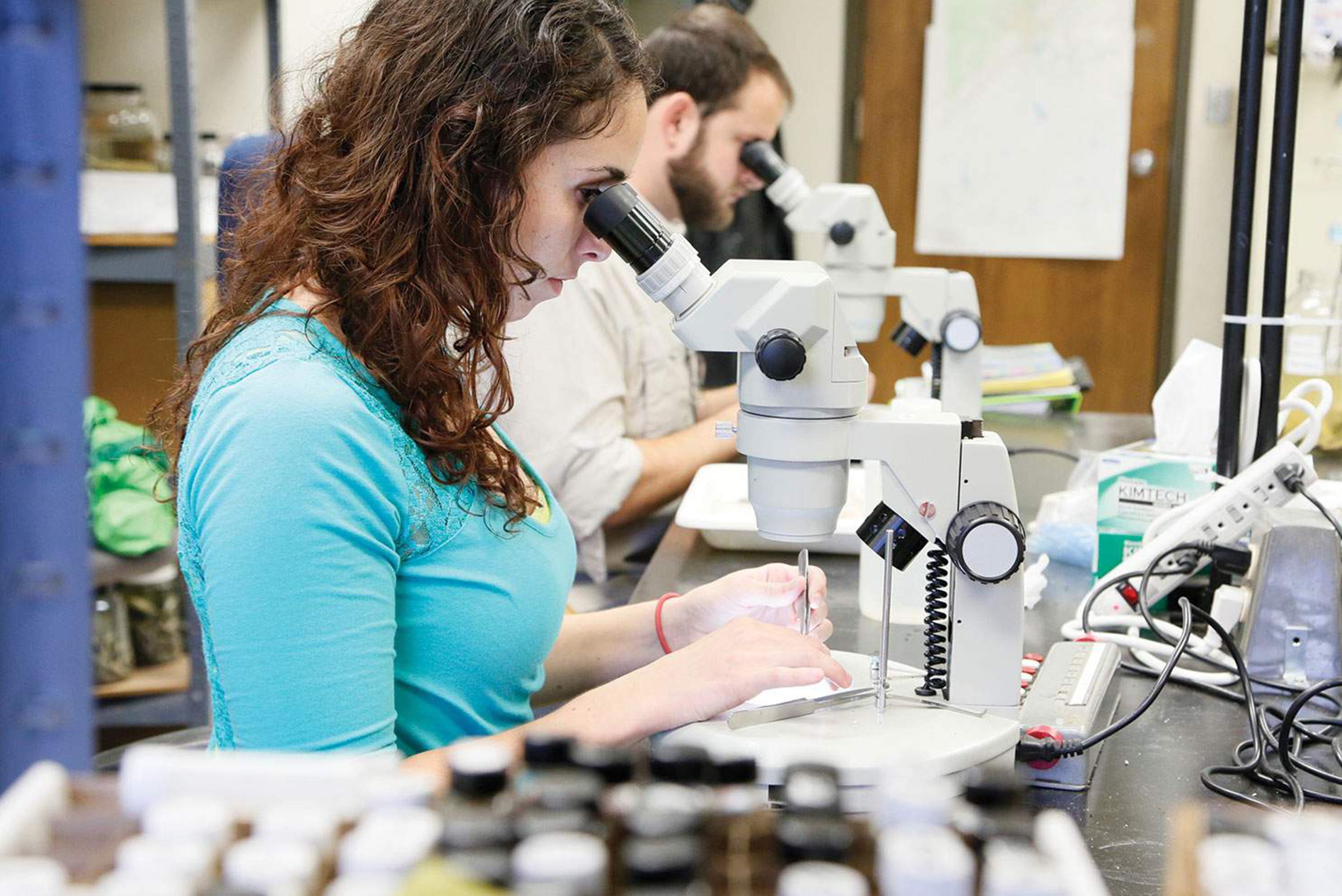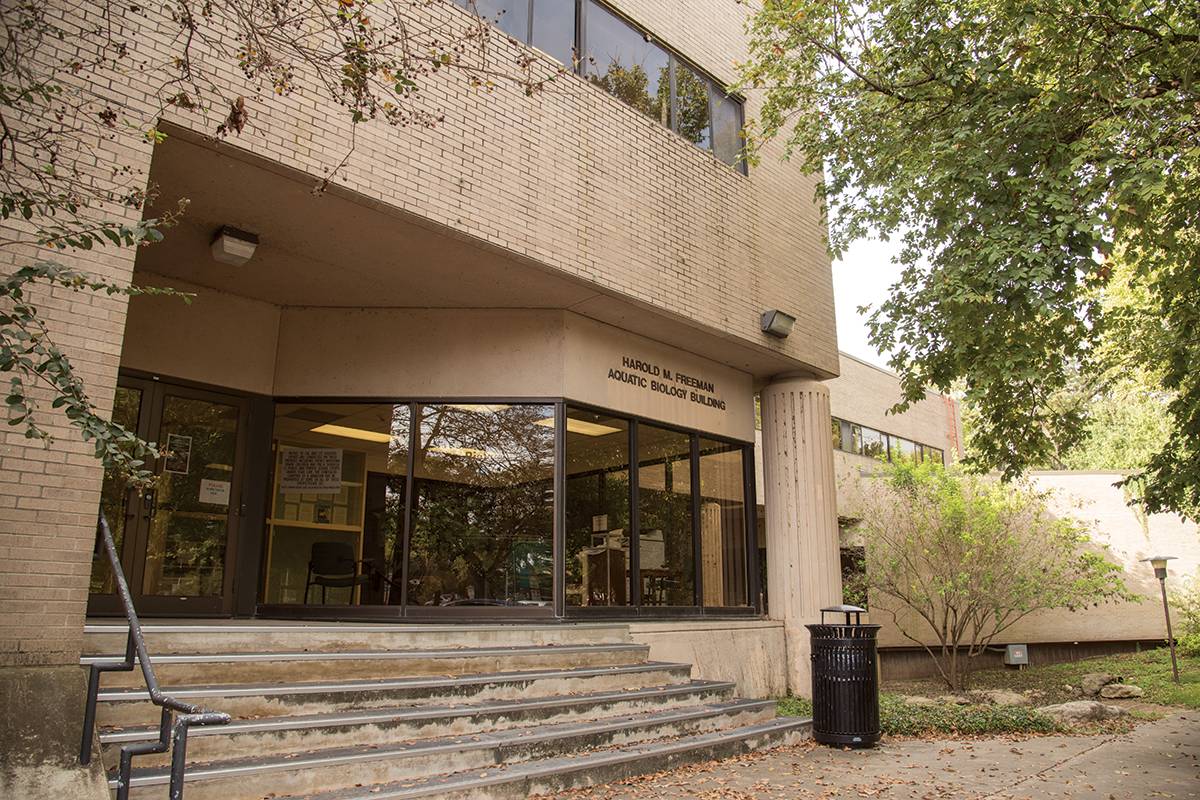Aquatic Resources (M.S.)
M.S. Aquatic Resources

Program Overview
Texas State's proximity to the San Marcos River and Spring Lake, the Meadows Center and the Freeman Aquatic Biology Building provides students with a unique opportunity for study and research. The location also offers students access to a diversity of exceptional aquatic ecosystems throughout the Texas Hill Country and the Edwards Aquifer.
Course Work
The Department of Biology at Texas State offers a Master of Science (M.S.) in Aquatic Resources, a thesis-based degree that requires a minimum of 30 credit hours of course work. Students take courses in statistics, seminars and elective courses, which include the ecology of aquatic ecosystems. They also carry out their own research project mentored by a biology faculty member and often in collaboration with state or federal agencies.
| Degree | Concentration | Hours | Thesis Option | Minor Option |
|---|---|---|---|---|
Degree M.S. | Concentration Aquatic Biology | Hours 30 | Thesis Option Thesis | Minor Option No minor |
Degree M.S. | Concentration Aquatic Systems | Hours 30 | Thesis Option Thesis | Minor Option No minor |
Program Details
Local resources give students the ability to study habitats for threatened or endangered species, develop and promote programs and techniques to ensure sustainable water resources.
Program Mission
The overall mission of the aquatic resources program is to:
- pursue questions related to aquatic resources at all levels of organization, from molecules to the biosphere, across a diversity of fields, including ecology, geology, hydrology, molecular and organismal biology, toxicology and resource management
- improve collective knowledge and literacy in the science of aquatic resources through experimental, theoretical and field research and disseminate this knowledge to the general public, academics, government and non-governmental organizations
- utilize knowledge of aquatic sciences and resources to address environmental, biological and societal issues the world currently faces
Related Programs: Ph.D. in Aquatic Resources and Integrative Biology
Career Options
Graduates enter careers in the fields of aquatic resource management, aquatic ecology and hydrogeology. Graduates are also able to find
research-oriented positions in government agencies, non-governmental organizations or the private sector. The program prepares students to teach at the community college level or to continue their education by pursuing doctoral studies.
Program Faculty
Faculty, as well as students, conduct research in the 30,000-square-foot Freeman Aquatic Biology Building which overlooks experimental ponds and the San Marcos River. It contains laboratories, a wet lab and an array of instruments for aquatic studies. The wet lab is equipped with holding troughs, artificial stream systems and aquaria for laboratory studies. Artesian well water from the Edwards Aquifer is continuously supplied to the wet lab and bioassay lab, ensuring a constant supply of high-quality water for research.
Contact The Graduate College for general questions about getting started with your application, funding your degree, and more. If you have program-specific questions after reviewing the program details, we encourage you to contact the following individuals.
Graduate Advisor
Dr. Astrid Schwalb
schwalb@txstate.edu
512.245.8648
Freeman Aquatic Biology (FAB), Room 206

Apply Now Already know that Texas State is right for you?
Application Deadlines
| Deadlines | U.S. Citizen | International |
|---|---|---|
Deadlines Fall - Priority | U.S. Citizen February 1 | International February 1 |
Deadlines Fall - Standard | U.S. Citizen June 15 (*Flexible) | International June 1 |
Deadlines Spring | U.S. Citizen October 15 (*Flexible) | International October 1 |
Deadlines Summer I | U.S. Citizen April 15 (*Flexible) | International No Admission |
*This program’s deadline is flexible for those not requiring an F/J visa. A flexible deadline means applications received after the standard deadline may be reviewed on a first-come, first-served basis with no guarantees for admission consideration.
|
|
Funding Information Applications must be complete by the priority deadline to be considered for certain types of funding. |
|
|
Decision Timeline This program reviews applications on a rolling basis. |
Admission Requirements
The items required for admission consideration are listed below. Additional information for applicants with international credentials can be found on our international web pages.
-
Application
- Completed online application
Review important information about the online application.
-
Application Fee
- $55 Nonrefundable application fee, OR
- $90 Nonrefundable application fee for applications with international credentials
Review important information about application fees.
-
Transcripts & GPA
Transcripts & GPA
- baccalaureate degree in biology or a related field from a regionally accredited university. (Non-U.S. degrees must be equivalent to a four-year U.S. Bachelor’s degree. In most cases, three-year degrees are not considered. Visit our International FAQs for more information.)
- a copy of an official transcript from each institution where course credit was granted
- minimum 3.0 GPA in your last 60 hours of undergraduate course work (plus any completed graduate courses)
You will be required to take leveling courses if you lack sufficient background course work. Any required leveling course work must be completed with grades of B or better prior to admission.
Review important information about transcripts. Official transcripts, sent directly from your institution, will be required if admission is granted.
Effective Fall 2024
- baccalaureate degree in biology or a related field from a regionally accredited university. (Non-U.S. degrees must be equivalent to a four-year U.S. Bachelor’s degree. In most cases, three-year degrees are not considered. Visit our International FAQs for more information.)
- a copy of an official transcript from each institution where course credit was granted
- a 3.0 overall GPA or a 3.0 GPA in your last 60 hours of undergraduate course work (plus any completed graduate courses)
You will be required to take leveling courses if you lack sufficient background course work. Any required leveling course work must be completed with grades of B or better prior to admission.
Review important information about transcripts. Official transcripts, sent directly from your institution, will be required if admission is granted.
-
Test Scores
GRE
- GRE not required
Approved English Proficiency Exam Scores
Applicants are required to submit an approved English proficiency exam score that meets the minimum program requirements below unless they have earned a bachelor’s degree or higher from a regionally accredited U.S. institution or the equivalent from a country on our exempt countries list.
- official TOEFL iBT scores required with a 78 overall
- official PTE scores required with a 52 overall
- official IELTS (academic) scores required with a 6.5 overall and
- minimum individual module scores of 6.0
- official Duolingo scores required with a 110 overall
- official TOEFL Essentials scores required with an 8.5 overall
This program does not offer admission if the scores above are not met.
Review important information about official test scores. -
Documents
- mentor recommendation letter from a current Texas State faculty member in the Department of Biology. Visit the faculty list for current faculty and their research interests and contact information. Your mentor must email their letter of support directly to The Graduate College at gradcollege@txstate.edu. This letter must be on file before the program's deadline.
- Since admission to this thesis-/dissertation-based program requires an intent to mentor letter (an agreement from one of our faculty members to supervise your research project) as part of the application process, we strongly recommend that applicants contact potential mentors by sending their CV and research interests and securing that agreement prior to submitting an admission application. The department cannot guarantee that a suitable mentor will always be available.
- resume/CV
- statement of purpose describing your professional aspirations and rationale for pursuing graduate study
- three letters of recommendation addressing the substance and quality of your preparation for graduate study
Review important information about documents.
- mentor recommendation letter from a current Texas State faculty member in the Department of Biology. Visit the faculty list for current faculty and their research interests and contact information. Your mentor must email their letter of support directly to The Graduate College at gradcollege@txstate.edu. This letter must be on file before the program's deadline.